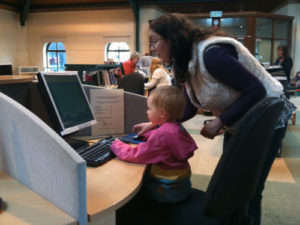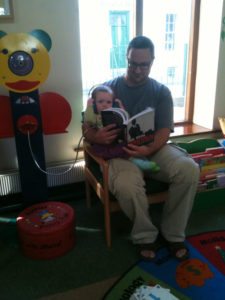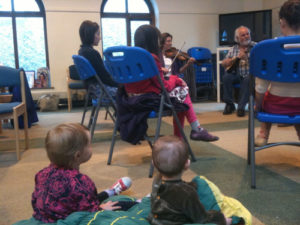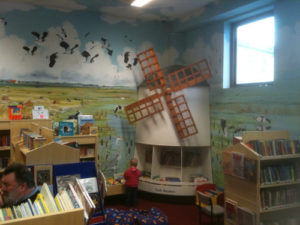On the 10th of October, Phil Hogan, the Minister for the Environment, Community and Local Government, announced that the Library Council (An Chomhairle Leabharlanna) was being dissolved. Bad as this news was for the council, it was a far worse omen for the future of the nation’s libraries. Particularly given the burnt-earth policy that is causing libraries to close all over the UK. In my view, the dissolving of the Library Council suggested that Mr Hogan, and the other people responsible for this decision, may not fully comprehend the value of public libraries. Perhaps this lack of comprehension is a result of the clumsy tools used when those in power attempt to assess and document that value.
 My wife, Maedhbh, is a librarian – one who loves her job, and the whole idea of public libraries. One of her convictions is that every member of staff in a library should have to do a ‘niceness test’. It sounds like an obvious quality to look for in people who will be dealing with the public. But one can only imagine the complex psychological analysis that would result should Human Resources ever attempt to put such a test into effect.
My wife, Maedhbh, is a librarian – one who loves her job, and the whole idea of public libraries. One of her convictions is that every member of staff in a library should have to do a ‘niceness test’. It sounds like an obvious quality to look for in people who will be dealing with the public. But one can only imagine the complex psychological analysis that would result should Human Resources ever attempt to put such a test into effect.
And yet, treating people decently is such a fundamental issue, and a key element in the success of any library (or, one would assume, in any service or business). The problem is, being decent to people is difficult to measure on a chart, or with statistics. So this post is devoted to those qualities that are almost impossible to quantify, but whose effects are tangible, and undeniably important. That Uncharted Territory.
It would be a mistake to label any public library as a mere lender of books, or even one that has expanded to music, films, games and other products. It is more than a drop-in centre for people looking for information on education and training, local services, or for free use of a computer. A library, for me, first and foremost, is one of the few branches of the public service that not only supports everyday life, but enriches it.
 One of the key ways it does this is in the way it offers a public space, where people can make contact – with the public service, with the state, and with each other. As shopping centres take over from town centres, as we lose the seating in our streets, as larger shops take over from local businesses and we build over the natural places people congregate, that public space is becoming all the more important.
One of the key ways it does this is in the way it offers a public space, where people can make contact – with the public service, with the state, and with each other. As shopping centres take over from town centres, as we lose the seating in our streets, as larger shops take over from local businesses and we build over the natural places people congregate, that public space is becoming all the more important.
We need to feel that the public service is still there for us, instead of being made to feel – as we increasingly do – as if we are there for it. As if our lives are constantly steered down channels gouged out between business and state. There must be a branch of the public service where we don’t begin our participation by taking a number, or a seat in an impersonal waiting room; where we don’t have to speak through a pane of glass, or have a form filled in before we reach the counter. We need a place where our participation is not merely facilitated, but is encouraged and welcomed. Where it’s okay to just come in and spend some time, to sit and read the papers all day, if you want.
There are some who would argue that the internet has put an end to the library’s reason for being – an information resource that is free to all – and to its staff as guides to help you find your way through that information. Now we have iPhones, Internet Explorer, Firefox, Amazon and Google. People who believe this are missing the point.
 Where else will you find a venue in the centre of a town, that is as comfortable holding a traditional music session, as it is hosting events for Science Week? A place where parents can bring their toddlers on a Saturday morning; where teenagers can congregate round computer screens, safe, but unsupervised. Where a local artist can hold his first ever exhibition, or a knitting group can meet every week over a cup of tea or coffee. A place where you might have a children’s book group, followed by an adult one. A place where you can come and study if you can’t find the space or the peace and quiet at home.
Where else will you find a venue in the centre of a town, that is as comfortable holding a traditional music session, as it is hosting events for Science Week? A place where parents can bring their toddlers on a Saturday morning; where teenagers can congregate round computer screens, safe, but unsupervised. Where a local artist can hold his first ever exhibition, or a knitting group can meet every week over a cup of tea or coffee. A place where you might have a children’s book group, followed by an adult one. A place where you can come and study if you can’t find the space or the peace and quiet at home.
Think about that for a minute: a publicly-funded, well-resourced place, complete with expert advisors, where a person has room and time to sit and think. A place where you can better yourself, but at your own pace. A place to sit and work out ideas; where someone might study for college, or plan a project, or start a business.
 A library is a public space where things are allowed to happen, where new events and projects can be encouraged and supported in a spontaneous, organic, community-driven way that does not require previous experience, or qualifications, or pages of forms, or a grant application, or a marketing strategy, or a business plan. It is a place where a community can develop and grow, and engage with the wider world. Like many public servants, librarians are there to help, but their role allows them to be flexible in the ways they can help. A public library means different things to different people, and a good librarian can find ways to enable people to do things that they otherwise could not.
A library is a public space where things are allowed to happen, where new events and projects can be encouraged and supported in a spontaneous, organic, community-driven way that does not require previous experience, or qualifications, or pages of forms, or a grant application, or a marketing strategy, or a business plan. It is a place where a community can develop and grow, and engage with the wider world. Like many public servants, librarians are there to help, but their role allows them to be flexible in the ways they can help. A public library means different things to different people, and a good librarian can find ways to enable people to do things that they otherwise could not.
That librarian can provide a venue for cultural events, for education; they can provide the headquarters for some community organization . . . or they can spend more time than is necessary chatting to some old woman, because they know that might be the most human contact that woman has all day.
 Libraries are one of the very few branches of the public service that inspire loyalty, and even love in the people that use them.
Libraries are one of the very few branches of the public service that inspire loyalty, and even love in the people that use them.
We live in a country where a sense of community is more vital than ever. We are governed by leaders focused on bleeding their citizens dry to reinvigorate zombie banks run by failed businessmen. There is so much emphasis on what we must have less of, but thinking small is no way to solve our problems.
If the government is serious about coming up with smart solutions, with a smart economy – if it wants to convince its citizens that its purpose is to do things for them, not to do things to them . . . then until it comes up with some wondrous institution that does more and does it better, it needs to leave our bloody libraries alone.

Thank you for writing this. It made me happy to read something that articulated how I feel about public libraries so well. But it made me a little sad too.
Thanks again.
Richard
Just something I thought needed saying, Richard. Librarians sometimes aren’t great at blowing their own trumpets, so I figured I’d do a bit of trumpeting for them. Let’s hope the dissolving of the Library Council isn’t the government’s means of testing the water to gauge how the profession will react to worse cuts.
Brilliant Oisin! I studied librarianship last year and then did an internship at the Library Council, which I loved. Very disheartened by the decision to axe it. I completely agree with what you’ve expressed here so well. The strongest defence of the public library in my opinion is that it is such a unique public space.
Thanks Maureen.
well said Oisín!
Along with public transport and public hospital wards, libraries are just another thing politicians don’t use and don’t understand – therefore they are easy to cut. Free car parking for life in the Dail and fat pensions however are used by politicians, so there is always a good reason to maintain them.
Moving words! But so true! I agree with each and every one of them! Well said!
Wonderful post, Oisín. Very well said!
Hear, here, Oisín
Thank you for your very insightful and articulate article on the value of our Public Library Service. Yes, libraries do inspire loyalty and love in the people that use them and their reach is way beyond the very limited quantitative measures by which their success is measured. Librarians are amongst the most cherished front-line staff in the Public Sector and having worked in a Public Library for ten years I can attest to the lengths that staff will go to deliver service. We must hope that the very excellent policy and development work which is carried out by the Director and her outstanding staff will be given full support and the recognition that it deserves in the new organisational structure. Without the powerful advocacy and unique expertise of the Library Council, many of the stunning new libraries which account for millions of library visits every year, would never have been built.Over the last two years many of our beautiful Carnegie built libraries celebrated the centenary of their opening and tonight I am reminded once again of Andrew Carnegie’s famous words which have even as potent a resonance today as they did 100 years ago. “There is not such a cradle of democracy upon the earth as the Free Public Library, this republic of letters, where neither rank, office, nor wealth receives the slightest consideration.”
― Thank you again Oisín
I wholeheartedly agree with everything you wrote.
As a child, I spent huge amounts of time in Marino Library.
I think one of the most important aspects of it is the community service it offers.
And the very simple basic point of a library is that people who cannot afford books can borrow them and bring them back and get more. This was really important to families in the 70s when I was growing up and the way the economy is going, it will become vital again.
One hundred percent agree Oisin. As an author travelling round libraries I am amazed at the diversity of things happening in them on any one day – they are a precious resource to young and old in this country. It would be a crime if Ireland mimicked what the UK has done to theirs and cast them aside.
Thanks, Paula. It’s hard to get everything they do across to people sometimes, so we fall back all too easily on the old refrain: ‘They’re full of free books!’
Excellent article Oisin. I actually feel like a trip to the library after reading it. Celia
Then it’s done it’s job, Celia!